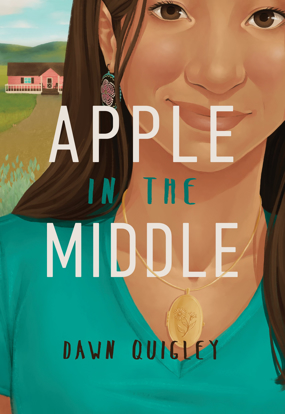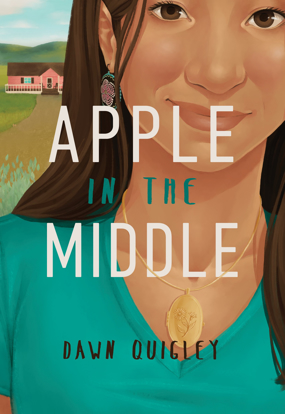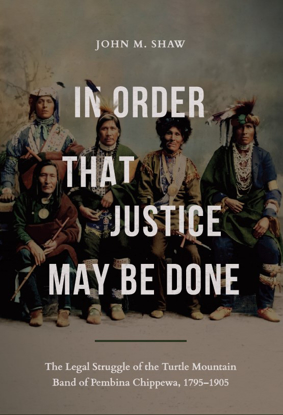North Dakota
Apple in the Middle
Apple Starkington turned her back on her Native American heritage the moment she was called a racial slur for someone of white and Indian descent, not that she really even knew how to be an Indian in the first place. Too bad the white world doesn’t accept her either. And so begins her quirky habits to gain acceptance. Apple’s name, chosen by her Indian mother on her deathbed, has a double meaning: treasured apple of my eye, but also the negative connotation—a person who is red, or Indian, on the outside, but white on the inside. After her wealthy father gives her the boot one summer, Apple reluctantly agrees to visit her Native American relatives on the Turtle Mountain Indian Reservation in northern North Dakota, for the first time. Apple experiences conflict as she deals with the culture shock of Indian customs and the Native Michif language, while trying to find a connection to her dead mother. She also has to deal with a vengeful Indian man who has a violent, granite-sized chip on his shoulder because he loved her mother in high school but now hates Apple because her mom married a white man. Yet, as Apple meets her Indian relatives this summer, she finds that she just may have found a place to belong. One by one, each character—ranging from age five to eighty-five—teaches her, through wit and wisdom, what it means to be a Native person, but also to be a human being while finding her place in the world. Apple shatters Indian stereotypes and learns what it means to find her place in a world divided by color.
Debut Young Adult Native American novel, by Dawn Quigley. Hardcover. 268 pp.
Winner of the 2018 Moonbeam Children's Book Award for Young Adult Fiction--General and the 2020 American Indian Youth Literature Honors Award
Apple in the Middle (pb)
Apple Starkington turned her back on her Native American heritage the moment she was called a racial slur for someone of white and Indian descent, not that she really even knew how to be an Indian in the first place. Too bad the white world doesn’t accept her either. And so begins her quirky habits to gain acceptance. Apple’s name, chosen by her Indian mother on her deathbed, has a double meaning: treasured apple of my eye, but also the negative connotation—a person who is red, or Indian, on the outside, but white on the inside. After her wealthy father gives her the boot one summer, Apple reluctantly agrees to visit her Native American relatives on the Turtle Mountain Indian Reservation in northern North Dakota, for the first time. Apple experiences conflict as she deals with the culture shock of Indian customs and the Native Michif language, while trying to find a connection to her dead mother. She also has to deal with a vengeful Indian man who has a violent, granite-sized chip on his shoulder because he loved her mother in high school but now hates Apple because her mom married a white man. Yet, as Apple meets her Indian relatives this summer, she finds that she just may have found a place to belong. One by one, each character—ranging from age five to eighty-five—teaches her, through wit and wisdom, what it means to be a Native person, but also to be a human being while finding her place in the world. Apple shatters Indian stereotypes and learns what it means to find her place in a world divided by color.
Debut Young Adult Native American novel, by Dawn Quigley. Hardcover. 264 pp.
Winner of the 2018 Moonbeam Children's Book Award for Young Adult Fiction--General and the 2020 American Indian Youth Literature Honors Award
Dust Yourself Off: The Gravel Road to a Good Life
Dust Yourself Off: The Gravel Road to a Good Life is the true story of a farm woman in 1940s/50s North Dakota who recovered from a series of shocks and tragedies – and the surprising ways in which she did that. “This project began because I wanted my kids and grandkids to know their grandmother,” said the book’s co-author Tom Sandhei of his mother, Muriel. “She was a remarkable woman.” After Sandhei took the story as far as he could on his own, he teamed up with Tricia Velure, a personal historian and writer from the neighboring town. “Tom and I unknowingly grew up on farms less than 20 minutes from each other in North Dakota, 30 years apart,” said Velure. “Decades later, we met in the Twin Cities, where we lived 10 minutes apart. We were meant to meet and write this story together!”
Dust Yourself Off chronicles Muriel’s life in Fort Ransom, North Dakota, known as “Little Norway” for its forested hillsides above the Sheyenne River Valley and predominantly Norwegian settlers. Readers follow Muriel and her family through farm life during the settlement period, World War I, Great Depression, World War II, and the 1950s. While the co-authors describe Muriel as a quintessential Norwegian American farm girl in North Dakota, she was forced to leave home at age 19. Death and tragedy visited her regularly in her 20s and 30s, when time and again she challenged the traditional norms of what it meant to be a farm woman in her day. Muriel’s quiet yet bold courage helped create this touching family story, rich in historical details and local color.
Velure never met Muriel, who died at age 82 in 2004, but she calls Muriel a “bonus grandmother” and believes readers will feel the same affinity. “This book will appeal to readers who enjoy farm and small-town stories, Norwegian American history, and inspiring stories of everyday women. If you wish you knew your grandparents’ life story, this is a book for you.”
About the Authors
Tricia Velure is a personal historian who helps elders share their life stories with their families. She grew up on her family’s cattle and small grains farm near Kathryn, North Dakota, and earned degrees in English and history from Valley City State University and a master’s degree in history from North Dakota State University.
Tom Sandhei is a retired school administrator who grew up on his parents’ and grandparents’ farms near Fort Ransom, North Dakota. He graduated from Valley City State College, began teaching, then earned a master’s degree in elementary school administration from North Dakota State University. His career in education spanned almost 40 years. Velure and Sandhei have lived in suburban Minneapolis/St. Paul since the 1990s.
In Order That Justice May Be Done: The Legal Struggle of the Turtle Mountain Band of Pembina Chippewa, 1795-1905
Tribal lands in tribal hands restrained the pursuit of profit. When the cultural identity of the Turtle Mountain Band of Pembina Chippewa was challenged by European Americans—who conceived of progress in terms of cultivated farmland—a tribal-federal conundrum occurred. Historian John M. Shaw untangles the culturally and legally contested concepts of land and its uses and ownership, providing a dynamic legal genesis of the Turtle Mountain Chippewa and their intentional action for change. Shaw presents a crucial analysis of federal policy and Native American resistance.
“Shaw systematically informs the reader of historical context and lays out the complex cultural influences—the nucleus of an emerging nation—of the Pembina Chippewa, providing unique insights into historical, legal, and political struggles. An overarching theme is the contrast and comparison of Indigenous and Western worldviews relative to international diplomacy. Shaw’s laser focus presents a critical and authentic analysis of social, economic, political, and cultural events that enveloped the Pembina Band of Chippewa and the United States of America.”—Les LaFountain, Tribal Educator and Historian; former Turtle Mountain Band of Chippewa Tribal Council Representative; former Legislative Assistant to the United States Senate Indian Affairs Committee
“In Order That Justice May Be Done is an excellent history of the struggle experienced by the Turtle Mountain Band of Chippewa to gain recognition as a tribe and to gain control of their homeland. The documented efforts of Chief Little Shell and Attorney John Bottineau deserve to be recognized and understood.”—Carol A. Davis, Senior Associate Tribal Nations Research Group; Turtle Mountain Community College Co-founder and Second Interim/Acting TMCC President
LCCN: 2022951183
ISBN: 978-1-946163-56-1
6" x 9"
440 pp., paperback
black & white photos and maps
bibliography and index
Tribal-Federal Relations | History 19th Century | Indian Reservations—Law and Legislation
About the Author: John M. Shaw grew up where George Washington led the Continental Army across the Delaware River and surprised the Hessian garrison at Trenton, New Jersey, on Christmas day, 1776. One of John's earliest childhood memories recalls his parents bundling him up on Christmas mornings to watch the annual reenactment. This tradition sparked his lifelong interest and passion for history, culmininating in an MA in American Indian Studies and a PhD in History, both from The University of Arizona.
In graduate school, a colleague informed John about a compelling microfilm of an eloquent prayer, address, and legal brief on behalf of the Turtle Mountain Band of Pembina Chippewa. Compiled by Métis tribal citizen and attorney John B. Bottineau, these inspiring documents provided a unique Indigenous perspective on the injustices of federal Indian policy. The tribe's legal struggle for land, sovereignty, and justice derived from the power to narrate their own side of the story through articulate chiefs and delegations, confirming that North Dakota's most populace Indigenous community remain a powerful people with a compelling history.
John contributed multiple entries to Making it in America: A Sourcebook on Eminent Ethnic Americans (2000) and The Encyclopedia of United States-American Indian Policy, Relations, and Law (2008), as well as several book reviews for UCLA's American Indian Culture and Research Journal and the New Mexico Historical Review. He has taught Native American and U.S. History courses for the departments of American Indian Studies, American Multicultural Studies, and History at The University of Arizona (1996–2003), Minnesota State University Moorhead (2004–2005), and Portland (Oregon) Community College (2005–present).
Sister Secrets: A Brother's Reveal
Sister Secrets: A Brother’s Reveal is a study in regret and hope for dealing with family members who suffer from mental illness, in this case, sisters who are too-late diagnosed with bipolar disorder. One sister is dead. The other is in prison. Sister Secrets is written by the brother, who examines family dynamics—a farm family in the Red River Valley, an often-absent father involved in politics, and sexual abuse—where people often don’t talk publicly (or privately) about mental illness.
Song for Liv, A
“A Song for Liv by Wayne Gudmundson is a love letter to his daughter, Liv. Serendipitously, the modern Nordic name Liv also means ‘life.’ As well as a gift to his daughter, A Song for Liv, is a personal meditation on place, the search for personal and ethnic identity, and the complexities therein, much of which is located in the mists (and myths) of time with only the ancient landscapes of those stories remaining. Combining travel notes, Icelandic history and lore, and family relationships, Gudmundson’s form here—best characterized as hybrid—weaves a tapestry that is at once inviting and accessible, each page entry a stanza-like lyric of the larger song."
—Thom Tammaro, three-time Minnesota Book Award recipient and author of When the Italians Came to My Home Town and Italian Days & Hours
“Written as a gift from a father to his daughter, A Song for Liv gathers up what wisdom and understanding a father can offer. His story begins its search for ancestral places in the Faroe Islands, where Gudmundson explores his investment in the larger Scandinavian world, having claimed a portion of the Faroes as his own. The narrative of the Norse invasion of Scandinavia continues on through Iceland to Canada to the settlement of Gimli, Manitoba, and from there to a small church in North Dakota, the home of Gudmundson’s grandparents and the protean poet K.N., whose spirit hovers over the entire narrative.”
—David Arnason, writer, professor, and Viking from Gimli, Manitoba





























